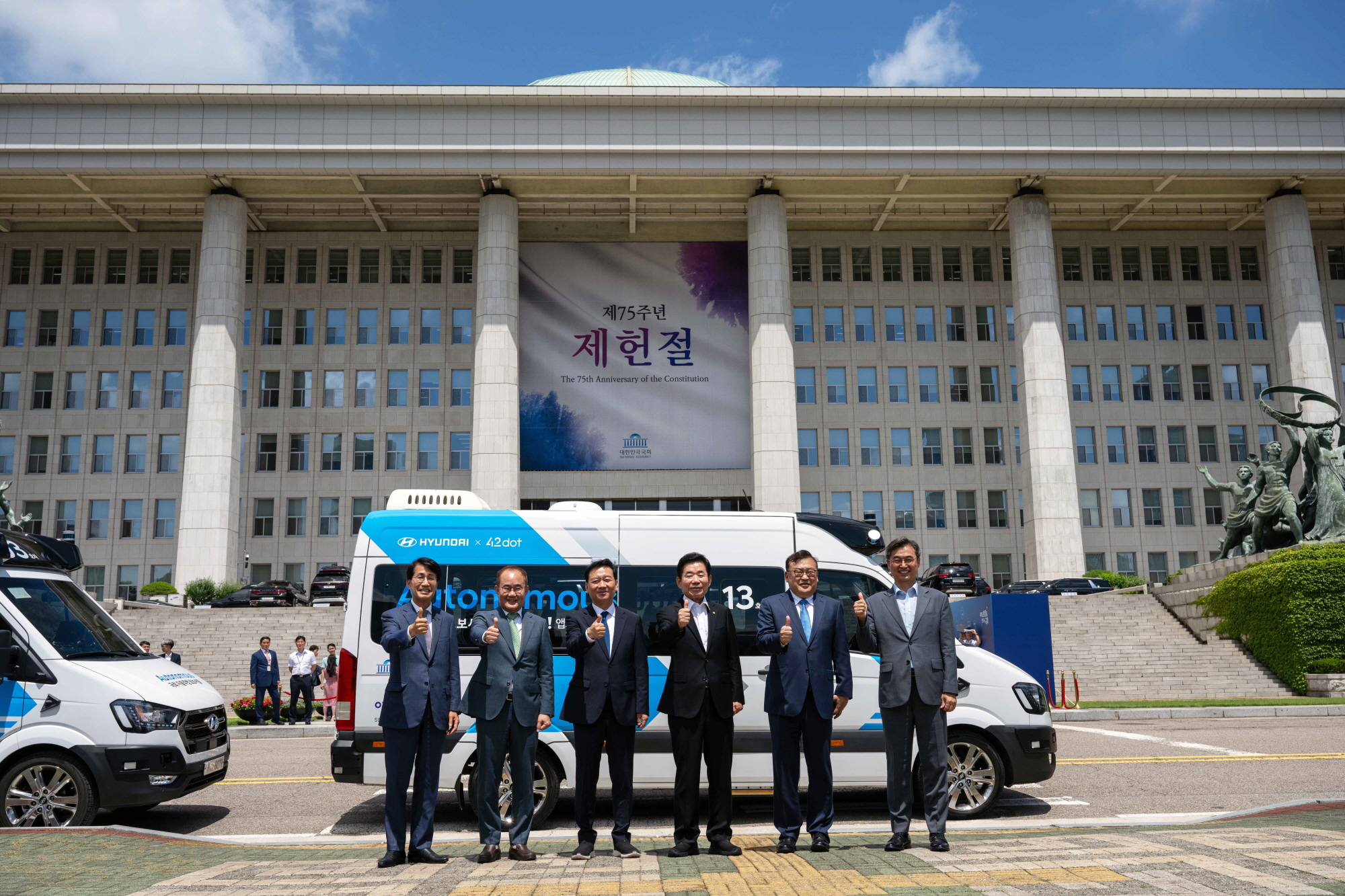
Hyundai Motor Company is launching a pilot service for its ‘Autonomous Robo Shuttle’, which combines artificial intelligence (AI) and self-driving technology at the National Assembly.
On the 5th, Hyundai Motor, along with the National Assembly Secretariat, hosted a commemorative passenger ride for the ‘National Assembly Autonomous Robo Shuttle’ with key figures in attendance, including Kim Jin-pyo, Speaker of the National Assembly, Lee Kwang-jae, Secretary General of the National Assembly, Jo Kyung-ho, Chief Secretary to the Speaker, Hong Hyoung-sun, Deputy Secretary General, Hyundai’s CTO Kim Yong-hwa, Vice President Kim Dong-wook, Executive Director Lee Hang-su, Executive Director Yoo Ji-han, and Jeong Jin from 42Dot.
Last November, Hyundai and the National Assembly Secretariat signed a business agreement for the introduction of the ‘National Assembly Autonomous Shuttle Bus’, undertaking road environment improvements and trial operations for self-driving within the National Assembly premises and visitor parking areas.
On this day, two autonomous Robo Shuttle vehicles (10-seater) based on the Hyundai Solati will operate in a loop connecting a 3.1km route between the National Assembly premises and visitor parking from 10 AM to 4 PM on weekdays, available free of charge to all National Assembly staff and visitors.
With the introduction of the first autonomous Robo Shuttle vehicles in the National Assembly, Hyundai aims to offer advanced self-driving technology experiences and improved mobility convenience to National Assembly staff and visitors, while also enhancing self-driving technology through testing in various road and traffic environments.
The term ‘Robo Shuttle’ is a combination of ‘Robot’ and ‘Shuttle’, representing a multi-passenger mobility that utilizes self-driving technology, with the pilot service employing level 4 core technology developed in-house by Hyundai.
Level 4 autonomous vehicles are characterized by their ability to sense and control driving conditions independently, requiring no driver intervention except under extraordinary circumstances.
Additionally, Hyundai has integrated the ‘TAP!’ (Tap) autonomous mobility platform developed by 42Dot, allowing passengers to input pick-up and drop-off locations via an app, providing real-time vehicle location and estimated arrival times, thus enhancing user-customized services.
By conducting autonomous Robo Shuttle pilot services in the National Assembly, Hyundai aims to stimulate interest in future mobility and create consensus on the need for regulatory easing and institutional support to nurture related industries.
Speaker Kim Jin-pyo stated, “The mobility industry, including self-driving cars, will be a core business for South Korea’s future. We must foster this industry for the future of our nation. In an environment like the National Assembly, where pedestrians and vehicles are mixed, the credibility of our autonomous vehicles will be greatly enhanced if representatives of the people and National Assembly members use them.”
Hyundai President Kim Yong-hwa said, “I hope this pilot service for the autonomous Robo Shuttle in the National Assembly will lead to further revitalization of the domestic mobility industry. We will actively pursue leadership in the future mobility market by developing optimal self-driving technologies and expanding continuous collaboration with 42Dot.”
Meanwhile, Hyundai has previously operated Robo Shuttle pilot services in smart cities such as Sejong and Pangyo Zero City to ensure safer and more convenient travel for customers and to respond to various urban environments and traffic conditions.
Written by Lee Sang-jin daedusj@autodiary.kr

